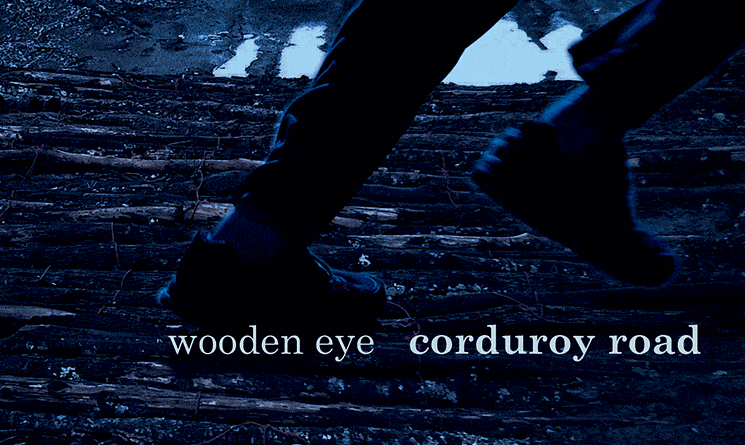“Split” by Big Mess/Black Norse
Salty Speakers
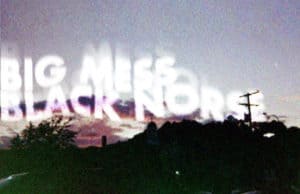
There’s something distorted (both literally and metaphorically) about doom metal. Black Norse and Big Mess ride along with the undercurrent of metal, but above the surface. Their distinct style breaks into a new wave of sound that reaches far beyond the conventions of the genre. It offers something artier, punker, eerier. The bass-heavy explosions of the guitars and the relentless snapping of the snare drums invoke the sonic weight that metal fans crave, but at the pace of molasses sliding down a wall.
The record opens with two tunes from Big Mess, a trio based in Lowell, Mass. The first tracks are “The Cutting Edge of Puppetry” and “Ambulance Pussy,” both featuring earth-shattering bass lines and sharp, skeletal guitar riffs laid out over mathy rhythms. These instrumental tracks are built on hypnotic melodies that slowly smolder until they explode into flames at the tap of a distortion pedal.
Wrapped around the assaulting tunes of Big Mess is Black Norse. Without losing the uncompromising power of their record-mates, the Dover-based duo employs catchy verses with a quiet-loud-quiet dynamic. Guitarist Ben Troy sings like Ozzy in his Black Sabbath days touched with a shade of the blues in songs like “Hell Fire,” while “White” features despairing vocals with doubly despondent minor-key melody. Black Norse concludes their song series with “Akiko,” a final effort of pulsing energy the band musters before the flat-line of noisy feedback brings their time on the album to rest.
The disc closes with the Big Mess-penned “Song For Bella (The Horse)” which starts off thunderous and gloomy, until the drop, when all instruments are cranked up to 11 and the slow tempos grow into pulverizing punches to the gut. Maybe it’s the way the feedback cuts short at the end of the last song, or the entrancing effect of the bands’ riffs, but to live in the album’s chaos doesn’t seem as doomed as the genre name would suggest.
“Corduroy Road” by Wooden Eye
Dirt Road Music
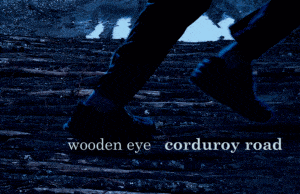
The art of storytelling is so ingrained in Wooden Eye as a band, even their name suggests there is a really good story behind it. What happened to the real eye? Why make it out of wood? How many splinters have you accumulated from that?
But that’s just the appeal and the promise of Wooden Eye’s charm; the songs on the band’s third album, “Corduroy Road,” are like short stories. “Night Drop,” for example, details the atmosphere of the Bahamas in the eyes of a drug supplier. “Acrobat Man” chronicles an entertainer performing physical feats for “beach bums” and “surfer dudes.”
With Mike “Bullfrog” Rogers’ hard-hitting harmonica, guitarist Bob Halperin’s twangy strings, and the swinging rhythm section of Dan MacLellan on bass and Joe Rogers on drums, Wooden Eye oscillates between the haunting jaunt of jazz and modernized outlaw country.
“All encompassing” is the most accurate way of describing Wooden Eye’s sound. The band’s ability to combine so many different styles is impressive. The band members have a lengthy musical history on the Seacoast and have collectively absorbed several decades of styles, and it shows on this recording.
On the surface, tunes like “Corner Lot” and “Forty Bucks” feature a signature Southern roots style that could have come straight from the riverbanks of the Mississippi. But Wooden Eye’s style defies the boundaries of any one time or region, telling a story without borders.
Wooden Eye will play a CD release show with guest Jerry Tillet at Portsmouth Book & Bar on Saturday, May 21, at 8 p.m.
“Hamper” by Greed Island
Salty Speakers
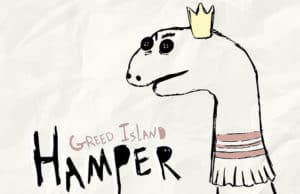
The newest addition to the impressive Salty Speakers/Cat Dead Details Later catalog is Greed Island. Like SST Records before them, Salty Speakers has collected a handful of bands that have the same general aesthetic binding them together, but each features its own unique sound.
Recorded at The Crawl Space in Dover and produced by Alex Bourne, Greed Island’s six-song mini-album partners the yin and yang of jerky post-punk and loose, sloppy garage rock. The trio fills out their power-pop sound with washing cymbals, loopy guitar riffs, and treble-tinged bass.
The songs transition well into one another, barreling through with the fun energy of old-fashioned rock ’n’ roll. But there’s something Pavement-esque in the way vocalist/guitarist Trevor Butler sings; his boyishly sung vocals, though sometimes indecipherable, are imprinted on infectious, whistle-able melodies that are easy to sing at shows. Just hope you’re not standing next to someone who will call you out for singing the wrong words. Trust me, from firsthand experience: You don’t want to be there.
The album’s apex is the concluding track, “Fault,” in which the band really reaches the next level. The thrash pop intensifies, layered with riffs like warning sirens reminiscent of the Pixies’ Joey Santiago. Butler belts out his part while guest vocalist Jess Hesse brings her beautiful falsetto into the thick of the song’s explosive finish.
With a series of shows already in the pipeline, “Hamper” is putting Greed Island on a fast track to becoming a staple in the Seacoast punk scene.
“End of the Highway” by Slow Coyote
self-released
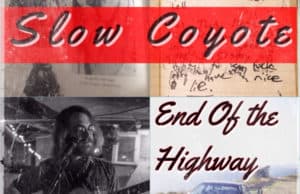
Folk has a lengthy history on the Seacoast, and acoustic music is arguably the most celebrated genre in the area. Because of this prevalence, it’s important to find a niche in order to stand against the grain. Slow Coyote’s amalgamation of lo-fi folk and unplugged grunge will certainly turn heads at the coffeehouse.
While many folk artists tend to focus on storytelling and work within traditional sound structures, Slow Coyote, aka Lucas Heyoka, strums abrasively, peppering his songs with stringy riffs to create a raw, unpolished, lo-fi aesthetic. On his sophomore album, “End of The Highway,” Heyoka’s statements about hot-button topics are presented undressed and without metaphor, like a version of the original Greenpeace artists revised for the 2010s.
With clear influences from both ’60s counterculture music and ’90s grunge, Slow Coyote lays the foun

